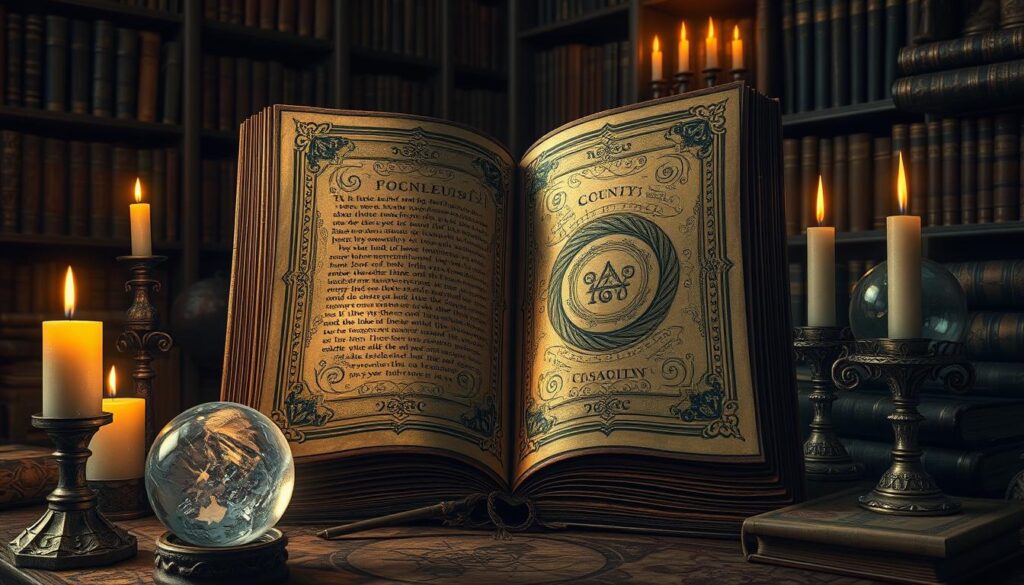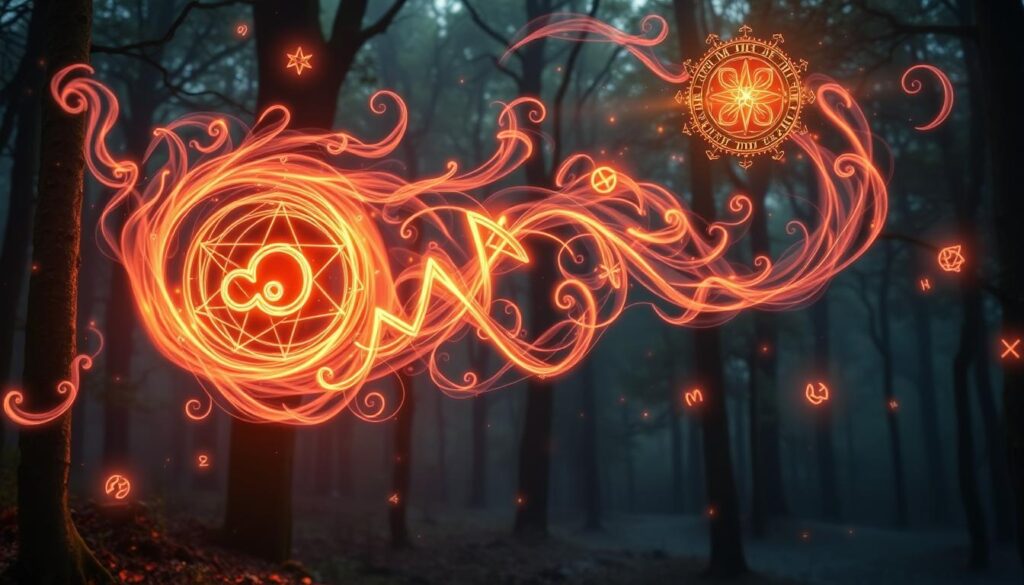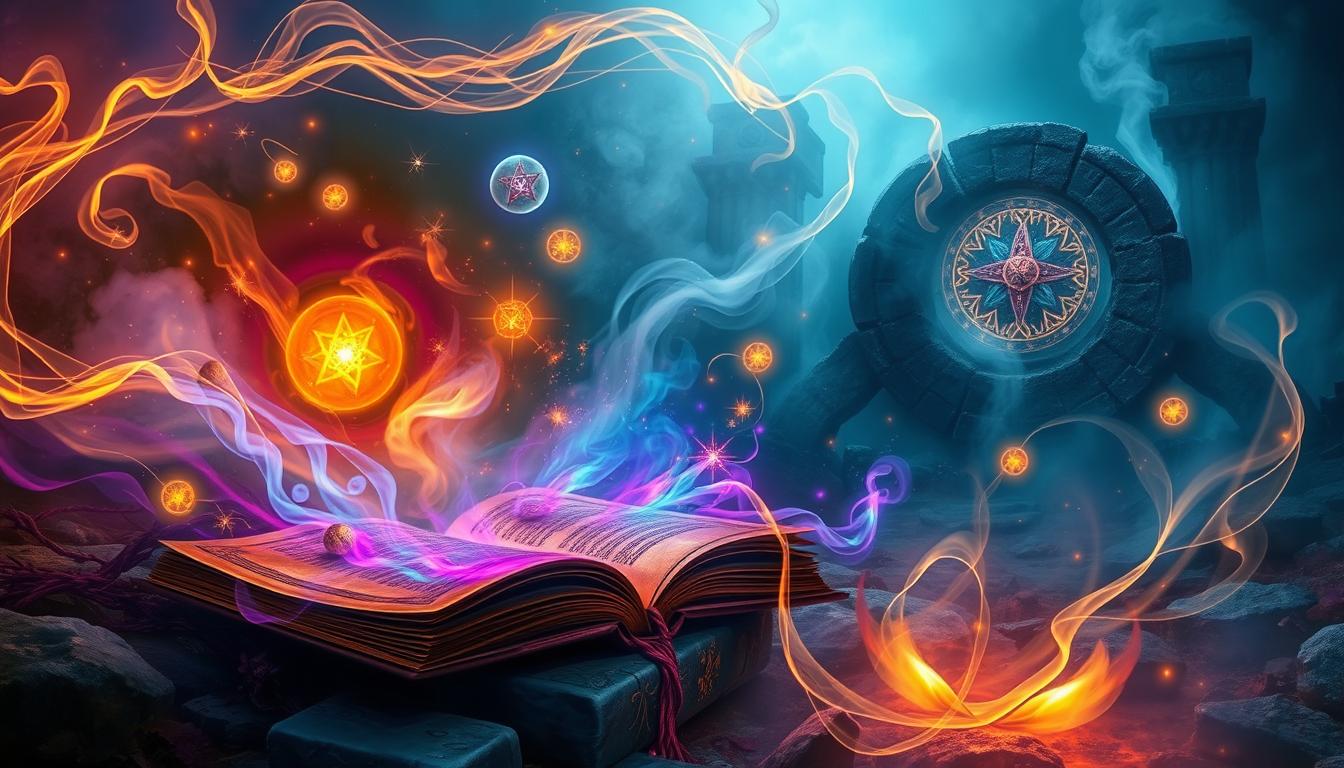In the mystical realm of magic, the power of words holds a profound significance. Ancient incantations and magical languages have long been believed to possess the ability to shape reality and manifest the impossible. From the earliest tales of sorcery to modern fantasy literature, the idea of a special tongue reserved for spellcasting has captured the imaginations of readers and practitioners alike.
The concept of magical languages is rooted in the belief that certain words or phrases can directly influence the fabric of existence. These words of power are often depicted as being intrinsically linked to the true nature of things, granting the speaker control over the objects and forces they name. In many fictional worlds, magic is treated as a fundamental force akin to physics, with its own set of rules and principles that can be manipulated through the careful application of language.
Beyond the realm of fiction, the use of ancient and esoteric languages in magical practice has a long history in real-world occult traditions. From the Latin incantations of medieval grimoires to the Sanskrit mantras of Eastern mysticism, the idea that certain linguistic forms hold inherent power has persisted across cultures and time periods. Even in modern times, many practitioners of magic continue to employ ancient tongues or craft their own magical languages as a means of focusing their intent and tapping into the primal forces of the universe.
Key Takeaways
- Magical languages are believed to possess inherent power and the ability to shape reality.
- Words of power in magical tongues are often linked to the true nature of things, granting control over what they name.
- The concept of magical languages appears in both fictional works and real-world occult traditions.
- Ancient and esoteric languages, such as Latin and Sanskrit, have long been used in magical practices.
- Modern practitioners may employ ancient tongues or create their own magical languages to focus intent and tap into primal forces.
The Power of Words in Magical Practice
Words hold immense power in the realm of magic, serving as the foundation for spellcasting and reality manipulation. Throughout history, practitioners of the arcane arts have recognized the significance of language in shaping the world around them. By harnessing the energy of spoken words and written symbols, they seek to unlock the secrets of the universe and bend it to their will.
Concepts of True Names and Primordial Tongues
Many magical traditions emphasize the importance of knowing the true names of things. It is believed that every object, being, and concept possesses a true name that encapsulates its very essence. By discovering and invoking these true names, practitioners gain a measure of control over the named entity. This concept is rooted in the idea that language is not merely a means of communication but a fundamental aspect of reality itself.
Primordial tongues, often associated with the language of creation or the speech of the gods, are considered to hold even greater power. These ancient languages are thought to predate human existence and contain the building blocks of the universe. Mastering a primordial tongue grants the ability to shape reality at its very core, as each word carries the weight of cosmic significance.
Controlling Reality Through Naming and Invocation
The act of naming is central to many magical practices. By assigning a name to an object or entity, practitioners establish a connection and assert a degree of control over it. This principle extends beyond mere labels; it encompasses the idea that by speaking a name, one can summon, command, or influence the named subject.
Invocation, the ritual recitation of names and phrases, is a key component of spellcasting. By carefully selecting and arranging words of power, practitioners aim to achieve specific magical effects. The precision and intention behind each utterance are crucial, as the slightest variation can alter the outcome of a spell.
| Magical Practice | Role of Language |
|---|---|
| Ceremonial Magic | Uses complex invocations and incantations in ancient languages to summon and command spiritual entities. |
| Chaos Magic | Emphasizes personal gnosis and the creation of unique magical languages and sigils. |
| Folk Magic | Incorporates regional dialects, rhymes, and chants passed down through oral traditions. |
| Enochian Magic | Utilizes the Enochian language, believed to be the tongue of angels, for powerful invocations. |
The power of words in magical practice extends beyond the mere utterance of sounds. It encompasses the understanding that language is a tool for shaping perception, belief, and ultimately, reality itself. By mastering the art of naming and invocation, practitioners seek to unlock the hidden potential within themselves and the world around them.
“Words are, in my not-so-humble opinion, our most inexhaustible source of magic. Capable of both inflicting injury, and remedying it.” – Albus Dumbledore, Harry Potter and the Deathly Hallows
Historical Use of Ancient Languages in Magic
Throughout the annals of magical history, practitioners have drawn upon the power and mystique of ancient languages to enhance their spellcasting and ritual work. From the hallowed halls of Western occultism to the sacred traditions of the East, these tongues have been revered for their ability to tap into primordial forces and communicate with unseen realms.
Latin as the Language of Western Occultism
In the Western esoteric tradition, Latin has long been considered the lingua franca of magic and occultism. Its use can be traced back to the medieval grimoires and the elaborate ceremonial rituals of the Renaissance magi. The precise pronunciation and intonation of Latin incantations were believed to be essential for invoking spirits, commanding demons, and unlocking the secrets of the cosmos.
Sanskrit and Classical Chinese in Eastern Traditions
In the spiritual and magical practices of the East, Sanskrit and Classical Chinese have held a similarly esteemed position. Sanskrit, the language of ancient India, is the foundation of countless mantras, hymns, and ritual texts used in Hindu and Buddhist traditions. Its vibrational qualities are thought to resonate with the fundamental energies of the universe. Classical Chinese, meanwhile, forms the basis of Taoist magic and divination, with its intricate system of characters and tonal variations used to interact with the subtle realms.
Norse Runes and Germanic Magical Alphabets
In the magic of Northern Europe, Norse runes and Germanic magical alphabets have played a vital role. These angular, symbolic scripts were used for divination, spell-casting, and inscribing talismans and amulets. Each rune was associated with a particular god, mythic figure, or natural force, imbuing it with potent magical properties. Systems like the Anglo-Saxon Futhorc and the Younger Futhark were employed by magicians and shamans to communicate with the spirit world and shape the course of destiny.
The use of ancient languages in magic is a testament to the enduring power of words and the belief that certain tongues possess an inherent connection to the divine and the mysterious forces that shape our world.
| Language | Magical Tradition | Key Features |
|---|---|---|
| Latin | Western Occultism | Precise pronunciation, ceremonial rituals |
| Sanskrit | Eastern Traditions (Hindu, Buddhist) | Vibrational qualities, mantras, hymns |
| Classical Chinese | Taoist Magic and Divination | Intricate characters, tonal variations |
| Norse Runes | Northern European Magic | Angular scripts, associations with gods and forces |
| Germanic Alphabets | Northern European Magic | Futhorc, Younger Futhark, inscriptions on talismans |
As modern practitioners continue to explore the rich tapestry of magical history, the allure of these ancient languages remains as strong as ever. By studying and incorporating these sacred tongues into their craft, they seek to tap into the wisdom of the ancients and harness the power of the spoken word in their quest for spiritual growth and transformation.
Fictional Examples of Magical Languages
In the realm of fantasy literature, magical languages play a crucial role in shaping the world-building and adding depth to the magical systems. These fictional languages often hold immense power, with each word or phrase carrying the potential to alter reality itself. From the ancient tongues of dragons to the divine speech of gods, these languages add a layer of mystique and intrigue to the stories they inhabit.

Earthsea’s True Speech and Dragon Language
Ursula K. Le Guin’s Earthsea series introduces the concept of True Speech, a language spoken by dragons and those well-versed in the magical arts. In this world, everything has a true name, and speaking that name in the True Speech grants the speaker power over the named object or being. However, the misuse of this language can lead to dire consequences, as demonstrated in the series.
The Ancient Language in the Inheritance Cycle
Christopher Paolini’s Inheritance Cycle features the Ancient Language, an elven tongue that allows users to control magic by uttering specific words. Each word in this language has a precise meaning and effect, making it essential for spellcasters to choose their words carefully. For example, the word “Brisingr” is used to conjure fire, while “Waíse heill” is employed for healing purposes.
| Fantasy Series | Magical Language | Key Features |
|---|---|---|
| Earthsea | True Speech | Language of dragons, true names hold power |
| Inheritance Cycle | Ancient Language | Elven tongue, specific words control magic |
| Fate/stay night | Divine Language | Spoken by Servant Caster, summons powerful elements |
| Kate Daniels series | Words of Power | Used to command others and objects, often fatal |
Divine and Eldritch Tongues in Fantasy Literature
Many fantasy works feature languages spoken by gods, demons, or otherworldly beings. These divine or eldritch tongues are often associated with immense magical power, capable of altering the fabric of reality. In the Fate/stay night series, the Divine Language spoken by Servant Caster allows her to summon powerful elements with a single word. Similarly, the Kate Daniels series by Ilona Andrews features mages who acquire words of power, enabling them to command others and objects, often with deadly results.
“The language of dragons is not like human speech. Every word is an act of magic, and the names of things are their true names.” – Ursula K. Le Guin, A Wizard of Earthsea
The use of magical languages in fantasy literature adds depth and intrigue to the magical systems, making them an integral part of world-building. By exploring the power of words and the consequences of their misuse, authors create immersive and captivating stories that continue to enchant readers across generations.
Real-World Occult Alphabets and Scripts
Throughout history, various occult alphabets and magical scripts have been developed or adapted for use in esoteric practices. These specialized writing systems often serve to imbue texts, talismans, and rituals with mystical power, while also obscuring their meaning from the uninitiated. Some of the most well-known examples include the Enochian alphabet, the Theban script, and the Celestial Alphabet.
The Enochian alphabet, created by John Dee and Edward Kelley in the late 16th century, consists of 21 characters believed to be associated with angelic beings and celestial powers. This script is central to the Enochian system of magic, which Dee claimed was revealed to him through angelic communication. Although not referred to as “Enochian” by Dee himself, the term has become widely accepted in modern occult circles.
Another notable occult alphabet is the Theban script, also known as the “Witches’ Alphabet.” Comprising 24 characters that correspond to the letters of the Latin alphabet, the Theban script gained prominence during the medieval period and has been extensively used in European witchcraft traditions. It is often attributed to the Sworn Book of Honorius, a medieval grimoire, and remains popular among practitioners of Wicca and other modern Pagan paths.
“The Celestial Alphabet, with its abstract symbols and association with angelic communication, has captured the imagination of occultists for centuries.”
The Celestial Alphabet, introduced by Heinrich Cornelius Agrippa in the early 16th century, features a set of abstract symbols believed to facilitate communication with angelic beings and invoke divine forces. Agrippa’s work has been highly influential in Western occultism, and the Celestial Alphabet continues to be used in various magical traditions.
| Occult Alphabet | Origin | Number of Characters | Primary Uses |
|---|---|---|---|
| Enochian | 16th century, John Dee and Edward Kelley | 21 | Enochian magic, angelic communication |
| Theban | Medieval period, attributed to the Sworn Book of Honorius | 24 | Witchcraft, Wicca, obscuring magical writings |
| Celestial | 16th century, Heinrich Cornelius Agrippa | 26 (abstract symbols) | Angelic communication, invoking divine forces |
Other notable occult alphabets and magical scripts include:
- The Malachim alphabet, introduced by Agrippa, consisting of straight lines and curves used primarily for inscribing talismans and magical objects.
- Ogham, a medieval Celtic alphabet with 20 characters associated with specific trees and their magical properties, used in divination and inscription creation.
- The Pigpen Cipher, also known as the Masonic Cipher, linked to the secretive Freemasons and Rosicrucians.
These occult alphabets and magical scripts serve as powerful tools for practitioners seeking to engage with unseen forces, encode esoteric knowledge, and craft potent ritual workings. By employing these specialized writing systems, magicians and occultists aim to tap into the mysteries of the universe and harness the power of the written word in their spiritual practices.
Blending Old and New in Contemporary Magical Practice
In the world of contemporary magic, practitioners are increasingly blending ancient tongues with modern language and techniques to create powerful, personalized spells and rituals. This fusion of old and new allows for a dynamic and evolving magical practice that draws upon the wisdom of the past while embracing the innovations of the present.
One notable trend in contemporary magic is the creation of personal languages and cipher scripts. These unique linguistic systems allow practitioners to encrypt their magical workings, adding an extra layer of secrecy and protection. By crafting their own language or script, magicians can infuse their spells with highly personalized symbolism and meaning, enhancing the potency of their rituals.
Creating Personal Magical Languages and Cipher Scripts
The development of constructed languages (conlangs) specifically designed for magical purposes is also gaining popularity among modern practitioners. These conlangs enable magicians to tailor their language to their specific needs and intentions, creating a linguistic framework that resonates deeply with their magical worldview. Some examples of magical conlangs include:
- Enochian: A language claimed to have been received by John Dee and Edward Kelley in the 16th century, believed to be the language of angels.
- Lingua Ignota: A mystical language created by St. Hildegard of Bingen in the 12th century, used for spiritual and visionary purposes.
- Ithkuil: A philosophical and magical language designed by John Quijada, aimed at expressing complex ideas with precision and clarity.
In addition to conlangs, some contemporary magicians also employ cipher scripts – alternative writing systems that encode meaning through unique symbols or glyphs. These scripts add an extra layer of obfuscation to magical writings, ensuring that only those with the necessary knowledge can decipher their contents. Popular cipher scripts in modern magical practice include:
| Cipher Script | Origin | Features |
|---|---|---|
| Theban Alphabet | 16th century | Used in Wicca and ceremonial magic |
| Celestial Alphabet | 16th century | Associated with Enochian magic |
| Malachim | 20th century | Used in Chaos Magic and Discordianism |
By blending ancient tongues, modern language, and innovative linguistic techniques, contemporary magicians are forging new paths in the realm of magical practice. Through the creation of personal languages and cipher scripts, they are able to craft highly individualized and potent spells that resonate with their unique magical identities and intentions.
“The art of language is the most powerful tool in the magician’s arsenal. It is through words that we shape reality and bring our Will into manifestation.” – Unknown
The Role of Intent and Meaning in Magical Speech
In the realm of magical practice, the power of words extends far beyond their literal meanings. The intent and emotional resonance behind the spoken language often play a crucial role in determining the efficacy of spells and rituals. Practitioners of magic recognize that the true significance of their words lies not only in their dictionary definitions but also in the symbolic weight and mystical associations they carry.

Words have long been associated with magical abilities in various traditions, emphasizing their power to influence and shape beliefs and emotions. A striking example of this phenomenon was demonstrated in a 1974 experiment, where individuals who were asked if they had seen “the” broken headlight in a car crash video were three times more likely to believe they had seen it compared to those asked if they had seen “a” broken headlight, even though there was no broken headlight in the video. This study highlights the profound influence that even a single word can have on memory and perception.
Dissociating from Everyday Language for Ritual Purposes
One strategy employed by magical practitioners to enhance the potency of their words is the use of languages they are less familiar with. By dissociating from the everyday meanings of words, they can imbue them with a sense of ritual significance. This technique allows them to focus on the intended purpose and emotional resonance of the language, rather than getting caught up in the mundane associations of their native tongue.
The root ‘spellam’ originally meant ‘story, saying, tale, history, narrative, fable,’ and during the Middle Ages, the term ‘spell’ evolved to signify a charm or magical incantation.
The history of language itself offers insight into the perceived magical power of words. For example, Proto-Indo-European languages arranged consonants for the word ‘wolf’ in peculiar ways, as people feared that speaking the word would magically summon the animal. This belief in the inherent power of certain words or names persists in many magical traditions to this day.
When analyzing rituals within societies, researchers often consider the ratio of words to actions as a quantitative aspect. This ratio can vary between rituals within the same society or between different societies, revealing a spectrum that ranges from rituals performed solely with words to those where actions dominate, though words are still included. The emphasis placed on verbal elements may differ depending on the type of ritual:
- Healing rituals and initiation rites tend to focus more on verbal communication
- Collective rites with mass participation may rely more on visible symbols
| Verbal Form | Characteristics | Purpose in Ritual |
|---|---|---|
| Mantra | Short, rhythmic phrases | Invocation, focus, and protection |
| Kannalavva | Narrative form | Explaining the illness and its causes |
| Kaviya | Poetic, metaphorical language | Evoking emotions and facilitating understanding |
In many rituals, such as the Sinhalese healing ceremony, the sequence and composition of verbal elements play a critical role in the logic and efficacy of the ritual. By carefully crafting the language used and delivering it with intent and emotional resonance, practitioners aim to facilitate a deep understanding of the purpose of the ritual, which is often seen as a prerequisite for its success.
Ultimately, the role of intent and meaning in magical speech highlights the transformative power of language when wielded with purpose and infused with emotional significance. By dissociating from everyday language and focusing on the symbolic weight of their words, magical practitioners seek to unlock the full potential of their spells and rituals.
Reconstructing and Reviving Ancient Magical Tongues
In the world of modern occultism, there is a growing interest in reconstructing and reviving ancient languages believed to possess magical properties. Scholars and practitioners alike are delving into the mysteries of tongues such as ancient Egyptian, Sumerian, and Enochian, seeking to uncover their original pronunciation, grammar, and vocabulary. By engaging in this process of language reconstruction, they aim to tap into the power and wisdom of these ancient magical traditions.
The revival of ancient Egyptian, one of the oldest written languages known to humankind, has been a subject of fascination for centuries. The language’s hieroglyphic script, filled with intricate symbols and hidden meanings, has long been associated with mystical and magical practices. Modern occultists, drawing upon the work of Egyptologists and linguists, seek to reconstruct the language’s phonology and grammar, allowing them to recite ancient spells and invocations with greater accuracy and potency.
Similarly, the Sumerian language, spoken in ancient Mesopotamia, has captured the imagination of those interested in magic and spirituality. As one of the earliest known written languages, Sumerian cuneiform texts are rich with incantations, hymns, and ritual instructions. By piecing together the language’s structure and vocabulary, modern practitioners aim to reconnect with the powerful magic of this ancient civilization.
“The language of the gods is the key to unlocking the secrets of the universe. By speaking in tongues long forgotten, we open ourselves to the wisdom of the ancients and the power that lies dormant within us.” – Anonymous occultist
Enochian, a language allegedly revealed to John Dee and Edward Kelley in the 16th century, holds a special place in the hearts of many occultists. Believed to be the language of angels, Enochian has been the subject of much study and speculation. While the original pronunciation and grammar remain somewhat elusive, modern magicians have attempted to reconstruct the language based on Dee and Kelley’s writings. By using Enochian in their rituals and invocations, they seek to communicate directly with celestial beings and harness the power of the divine.
As more occultists and linguists engage in the process of language reconstruction and revival, new possibilities for spellcrafting and magical exploration emerge. By breathing life into these ancient tongues, practitioners hope to uncover lost knowledge, forge deeper connections with the unseen world, and expand the boundaries of contemporary magical practice.
Controversies and Debates in Magical Linguistics
The use of ancient and culturally significant languages in magical practice has sparked a heated debate among practitioners and scholars alike. At the heart of this controversy lies the delicate balance between tradition and innovation, as well as the critical issue of cultural sensitivity and appropriation in the realm of spellcrafting.
Questions of Appropriation and Cultural Sensitivity
One of the primary concerns surrounding the use of ancient tongues in modern magical practice is the potential for cultural appropriation. Many argue that employing these languages without a deep understanding of their cultural context and historical significance can be disrespectful or even harmful to the communities from which they originate. This is particularly true when practitioners from dominant cultures adopt the languages of marginalized or oppressed groups without proper acknowledgment or respect for their traditions.
On the other hand, some practitioners maintain that the universal nature of magic transcends cultural boundaries and that the power of these ancient languages can be harnessed ethically by anyone with a sincere desire to learn and understand them. They argue that the sharing of knowledge across cultures can lead to greater understanding and appreciation of diverse magical traditions.
Balancing Tradition and Innovation in Spellcrafting
Another significant challenge faced by modern practitioners of magical linguistics is the need to balance the preservation of tradition with the drive for innovation. As the world continues to evolve and change, many feel compelled to adapt ancient tongues to contemporary needs and contexts. This can involve the creation of new words, phrases, or even entire languages that blend elements of the old with the new.
However, this process of innovation must be approached with care and respect for the integrity and power of the original languages. Some worry that too much modification or experimentation could dilute the potency of these ancient tongues or lead to the loss of important cultural knowledge.
| Approach | Advantages | Disadvantages |
|---|---|---|
| Strict Traditionalism | Preserves cultural heritage and maintains the integrity of ancient languages | May limit the adaptability and relevance of magical practice in contemporary contexts |
| Radical Innovation | Allows for the creation of new, culturally-specific magical languages and practices | Risks appropriating or disrespecting the traditions of marginalized cultures |
| Balanced Approach | Seeks to honor tradition while carefully incorporating new elements to meet modern needs | Requires ongoing dialogue, cultural sensitivity, and a deep understanding of the languages and traditions involved |
Ultimately, the key to navigating these controversies and debates lies in approaching the study and use of magical linguistics with a spirit of respect, humility, and a commitment to ethical practice. By engaging in ongoing dialogue, seeking the guidance of knowledgeable elders and teachers, and striving to understand the cultural context of the languages they work with, modern practitioners can help ensure that the power of ancient tongues is wielded responsibly and with reverence for the traditions that have sustained them through the ages.
Conclusion
Throughout history, the power of words has been an integral part of magical practice, with ancient tongues and modern interpretations shaping the art of spellcasting. From the enigmatic hieroglyphs of ancient Egypt to the mystical incantations of contemporary occultists, the language of magic has evolved and adapted to the needs of practitioners across cultures and eras. By delving into the rich tapestry of magical linguistics, we gain a deeper understanding of the significance of names, invocations, and the very act of speaking in the realm of the arcane.
As modern spellcasters continue to draw upon the wisdom of the past while forging new paths in their craft, the role of language remains paramount. Whether through the study of ancient grimoires, the creation of personal magical scripts, or the mindful use of intent and meaning in ritual speech, the power of words endures as a cornerstone of effective spellwork. However, as we navigate the complex landscape of magical language, it is crucial to approach these sacred tongues with respect, sensitivity, and a commitment to ethical practice.
In the end, the language of magic serves as a bridge between the seen and the unseen, the spoken and the manifested. By embracing the power of words and the profound influence of the tongues we use, practitioners of the arcane arts can unlock new realms of possibility and deepen their connection to the mysteries that lie beyond the veil. As the study of magical linguistics continues to evolve, so too will our understanding of the transformative potential that lies within the very words we speak.



